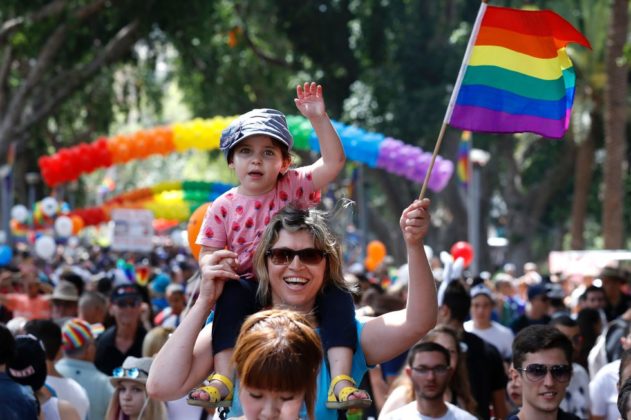With Donald Trump’s election, the LGBTQ+ community is again in crisis mode and my only way forward is to fight.
The Equality March for Unity and Pride takes place this Sunday, June 10, in Washington D.C. There will also be a host of local marches around the country. According to the organizers, the goal of the rallies is to mobilize the LGBTQ+ communities around issues related to the current political landscape, especially as it relates to the persecution and discrimination of LGBTQ+ individuals.
My wife, son, and I will be there. Prior to last November’s election, I had largely been uninvolved in LGBTQ+ causes. I am an introvert, and have believed more in gutting out or working around personal adversity than taking a longer view to fighting discrimination.
When I realized at the age of 23 that I was a lesbian, I left the small Midwestern city I was in and moved to Chicago, the closest place with a sizable LGBTQ+ population. My now wife and I navigated around the same-sex marriage ban by registering as “domestic partners” and saying our vows in Canada. I used employer sponsored legal insurance to pay for the adoption of the son my wife gave birth to.
I told myself I was fighting discrimination at the individual level. I used bureaucracy against itself, finding ways to navigate around road blocks imposed by those who hated me for being a lesbian.
When my Canadian marriage was recognized in Illinois I felt a vague sense of guilt that I had simply watched our community take that huge step forward, but that guilt never translated into actions.
My turning point was when I sent my son Bobby to school. He has a diagnosis of Down syndrome and so the clear paths of life are largely unavailable to him. I am a good advocate, but still I often found that we were marginalized by school administrators. Teachers were quick to label Bobby as “severely disabled” and quit trying to draw language and social skills out of him. I spent a lot of time fighting and failing.
But it humbled me. My privilege certainly helped me find good placements for Bobby and ultimately he proved he was much more capable than his early teachers believed. But unlike my experiences as a lesbian where I only occasionally felt limited and never felt powerless, I quickly realized there was no golden key of privilege that would clear a path for Bobby.
I also understood, finally, that there were certainly people in the LGBTQ+ community who faced blockades equal to my son’s. Not everyone can upend their life to move to a gay-friendly city where they feel safe. Not everyone has the employer benefits that cover adoption legal fees. And for me, those things were not the result of any innate self-sufficiency. I was lucky to come out at a time when my personal/social ties were relatively unencumbered, making a move to Chicago easy. I was privileged to have a good job with extensive benefits.
Make no mistake, I only begrudgingly gave up my notions of having pulled myself up by my bootstraps. As I unpacked my old beliefs, I vacillated between feeling like a huge schmuck for my old attitudes and feeling a little too precious about getting “woke.” But my transformation was rooted in the bitter taste I felt watching my son be left behind by a society who didn’t understand his challenges. I couldn’t be that indifferent person again.
With Donald Trump’s election, the LGBTQ+ community is again in crisis mode and my only way forward is to fight. I can’t be content to use my privilege to insulate myself. I have to use it as a tool in the larger social struggle. I described my newfound attitude to a friend as being “more gay,” meaning I no longer would be waffling about my level of advocacy or reveling in my newfound “wokeness.” The right wing in this country has declared war on a good portion of our society and I am ready to fight for my LGBTQ+ community, for my son, for anyone who doesn’t have the easy outs that for so long sheltered me from any heavy repercussions of my identity.
Anne Penniston Grunsted writes about parenting, disability, and family life from her perspective as a lesbian mama. She has been published in The Washington Post, Brain, Child Magazine, and Mamamia. She lives in Southern California with her partner and son.
Other Links:

